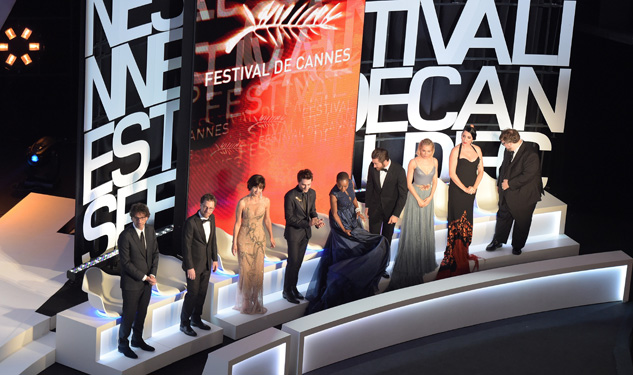
- Industry
Cannes – The Round Up
A better selection than in the recent past, gridlock on the Croisette and a ridiculous scandal that should not have been.
This year’s selecting and programming committee ought to be applauded for a number of reasons. On average they chose much better films than in previous years, there was more diversity and some of them were even directed by women. The good movies were spread out evenly over the course of 11 days, there was no overkill of huge stars during the first weekend, and to close the competition with Macbeth was a smart decision, saving two big names – Michael Fassbender and Marion Cotillard – for last.
No one can possibly like everything but we liked a lot more this year. Even the out-of-competition Hollywood blockbusters weren’t as in-your-face as usual. Mad Max:Fury Road played as well in Cannes as it has been all over the world. Woody Allen’s Irrational Man was hailed by Allen-Fans (not just the French) and not trashed by harsher critics. And the legendary director only irritated his TV-network when he called the series he had been talked into “the worst job of my life”. This was vintage Woody, of course, and luckily his bosses were not too offended. After all the man once famously called himself an “un-hedonist whose glass is always half empty”.
A considerable number of foreign filmmakers made their English language debut, Matteo Garrone with Tale of Tales, Michel Franco with Chronic and Joachim Trier with Louder Than Bombs, among them. It worked in one case and not so much in the others. Some big surprises happened in the second half of the festival. The unexpected The Assassin was loved by many and threw a bit of a wrench into the supposed sure-fire prediction that either Carol or Son of Saul were going to take the Palme d’Or. (In the end, Son of Saul garnered the Grand Prix and Hou Hsiao-Hsien won the Director prize). On the other side of the spectrum, Gaspar Noe did not live up to his violent and pornographic reputation with Love, and one critic had to change his pre-written story titled ‘A Musterpiece’ at the last minute. But none failed as spectacularly as Gus Van Sant. His Sea of Trees was unanimously destroyed and loudly booed, not just at the press screening (where there is less restraint and politeness) but also at the premiere. French films ranked somewhere in the middle – none excited too much, but neither was there a review written about La Tete Haute, Marguerite & Julien, Mon Roi or Dheepan. The bigger the surprise (or shock) that Audiard walked away with the Palme. The Holocaust drama Son of Saul left audiences shocked and saddened and Natalie Portman’s impressive directorial debut A Tale of Love and Darkness proved that the Oscar-winner has a lyrical talent for film making. And there was even a thriller about the U.S.-Mexico drug war: Sicario with Emily Blunt, Josh Brolin and Benicio del Toro, though too violent for some, played well with festival audiences. Two documentaries stood out: Amy about the tragic life and death of Amy Winehouse had many talking about a shoe-in for an Oscar nomination next year. The Livia Firth-produced and Andrew Morgan-directed The True Cost woke up many fashionistas who swore they would never buy clothes made in sweatshops by child laborers again.
On the downside of Cannes there is the sad fact that this festival has still not gotten its traffic problem under control. And by that we mean motorized AND pedestrian traffic. For years smart people have suggested that the powers that be have the two long blocks between the Casino and Palais all the way to the Hotel Majestic and up to the corner of the Rue de Serbes (in other words between the corner cafe and Gucci) closed to any cars except the official festival vehicles that drop off jury and stars at the Red Carpet entrance. Kind of like what Venice does so well: eliminate the tourist traffic and open up the street to fans and pedestrians. This would also take care of the hazardous metal barriers with their sharp stands that bloody toes every year when people rushing to screenings, meetings and interviews hurt themselves. With 15-30 events taking place at the same time every minute of the day, everyone in Cannes is in a rush. Except for the gawking tourists who subject their small kids to the onslaught of stressed-out journalists, producers and distributors. Warning signs that read ‘Save your kids! Take them to the next town!’ should be displayed along the Croisette. And last, but not least, there was the PR-nightmare of Heelgate. Festival director Thierry Fremaux denied that he had issued a rule of high heels only for female premiere attendees. Overzealous security guards were blamed for the debacle after they turned away women with orthopedic problems (and many others who are simply too tall or prefer flats). One wishes they had turned away no-names in scary outfits instead. But there is no accounting for taste.
Speaking of taste or lack of it, on the superficial front, Cannes turned into the usual designer runway show every night, with too many models in too many atrocious outfits, but French elegance and international flair among the actresses and jurors. (See our Best & Worst list)
Will the winners go on to other prizes and carry the momentum into Hollywood’s award season? Rooney Mara is a good bet and Jacques Audiard may even be a real contender for foreign language film.
Elisabeth Sereda